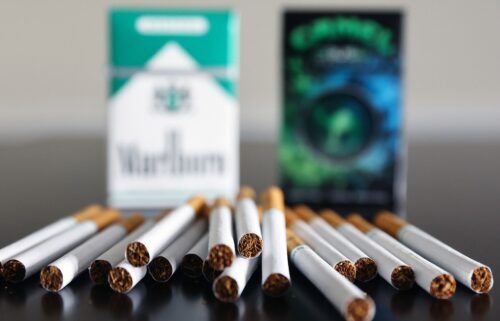Mpox cases in the US are on the rise as vaccination rates lag and new threats loom
By Deidre McPhillips, CNN
(CNN) — Mpox cases in the United States are twice as high as they were at this time last year, and experts are stressing the importance of improving vaccination coverage as transmission risks rise.
There have been 511 cases reported this year through March 16, according to data from the US Centers for Disease Control and Prevention — compared with fewer than 300 cases by late March 2023.
Transmission rates are still far below levels from 2022, when there were tens of thousands of cases in the US. But after a quieter year last year, experts say the US is vulnerable to increases in spread in a number of ways. The public health emergency in the US expired more than a year ago, cutting the amount of federal resources available to manage the public health response. And relatively low vaccination rates leave many at risk.
In December, the CDC also sent a health alert warning health-care providers about another subtype of the virus that has been found to be more transmissible and cause more severe disease than the subtype associated with the 2022 outbreak in the US. This particular genetic clade has not been identified in the US, but it is spreading in the Democratic Republic of Congo.
“This has the potential to become a fairly prevalent infectious disease, but the advantage with mpox is, we have a vaccine that’s effective. We don’t have that for syphilis, gonorrhea, chlamydia or HIV,” said Dr. Marcus Plescia, chief medical officer for the Association of State and Territorial Health Officials. “We’ve had fairly good participation in the vaccination push, but we’re not anywhere close to getting most of the at-risk population vaccinated. Until that happens, we’re going to see outbreaks and upticks in cases in various places.”
Mpox, formerly known as monkeypox, is a less severe cousin of the now-eradicated smallpox virus, and it is spread through close personal contact. Initial symptoms are typically flu-like — including fever, chills, exhaustion, headache and muscle weakness — often followed by a rash with raised lesions that scab over and resolve over a period of weeks.
Although anyone can get mpox, men who have sex with men are particularly at risk, and those who have HIV are more vulnerable to severe outcomes, including death. The vaccine, manufactured by the Danish company Bavarian Nordic under the brand name Jynneos, has a recommended two-dose regimen, with the shots given about a month apart.
In most states, less than a quarter of the population at risk has been fully vaccinated with the two-dose series since it was authorized for emergency use in August 2022, CDC data shows. As of January, coverage is highest in the District of Columbia, where 68% of the at-risk population has gotten both shots, but coverage is less than half in every other jurisdiction. Coverage is below 10% in eight states.
Nearly all US regions have reported more cases this year than in the first three months of 2023, with the largest difference in the mid-Atlantic region, particularly New York City, CDC data shows.
On Monday, the Virginia health department sent out a notice to raise awareness about a recent rise in cases.
The state has had as many cases this year as there were in all of 2023. Cases have also been reported from regions across the state, but last year’s cases were concentrated in the north part of the state. Among the 12 cases, four required hospitalization, six also had HIV, and none had been vaccinated, the notice said.
“We felt like it was really important to get the word out that there is a continued risk from this virus. It’s still here,” said Dr. Brandy Darby, director of the Division of Surveillance and Investigation in the Office of Epidemiology at the Virginia Department of Health. “We also wanted to give people time to protect themselves ahead of Pride season. We’re hoping this might encourage people to go ahead and get vaccinated so they can go out and enjoy their celebrations and not have to worry so much about mpox.”
Curbing the spread of mpox will require a compassionate and tailored effort to reach the populations most at risk, said Jeffrey Crowley, distinguished scholar and director of the Infectious Diseases Initiative at Georgetown’s O’Neill Institute for National and Global Health Law. In May, he co-authored a report outlining the lessons learned one year after the initial outbreak and actions needed to prevent a resurgence.
“Public health really came forward and said, ‘This is something we’re concerned about. We care about you,’ ” he said. “Going forward, we need to look for these affirming ways to generate trust and build strategic partnerships with the community groups that are most able to reach the people at highest risk.”
A US survey from August 2022 found that about half of men who have sex with men changed their behaviors because of the mpox outbreak that year, by reducing either their number of sex partners, one-time sexual encounters or use of dating apps. Research has found that these changes had a significant effect on curbing the spread, but experts say that vaccination is a more realistic and sustainable measure for prevention.
“Certainly, I feel like HIV has taught us that people aren’t going to abstain forever. So we need these other tools,” Crowley said.
Mpox vaccines do not require annual boosters; once a person completes the two-dose series, coverage lasts long-term. Although there is a recommended four-week window between the first and second shots, experts say that people who got only the first shot but want to improve their coverage can get the second shot outside of that period without restarting the series. And the vaccine that’s available in the US will also offer protection against the more severe subtype of the virus if it does begin to spread in the US.
The federal government managed the supply of mpox vaccines available in the US during the public health emergency, but that process has since been commercialized. The government does have some supply remaining, and the vaccine is also expected to be available in pharmacies and health-care offices next month, experts say.
Although this may help expand access to vaccination for some, it also comes with its own challenges, experts say.
“There’s now adequate supply of the vaccine, and we have a little better handle on the outbreaks, so we’re transitioning back to the commercial system. That’s the way we do business in the United States,” Plescia said. “But we often lose our visibility of exactly what’s going on. We just don’t have as much information about who’s getting the vaccine and if there are shortages.”
And access to treatment remains a challenge, which makes preventive measures even more important, said Elizabeth Finley, senior director of communications and prevention programs with the National Coalition of STD Directors. But the sexual health field faces a number of rising concerns amid tight budget pressures.
“We’re mindful that people aren’t necessarily getting the treatment that they need, and there’s some administrative barriers to that right now,” she said. “The all-hands-on-deck effort has now really been folded into the day-to-day work of STD and HIV prevention, and those are very stretched systems.”
The-CNN-Wire
™ & © 2024 Cable News Network, Inc., a Warner Bros. Discovery Company. All rights reserved.


